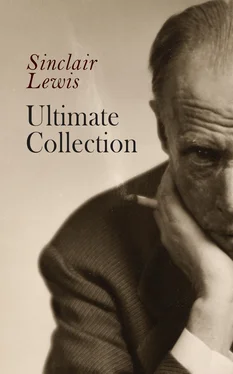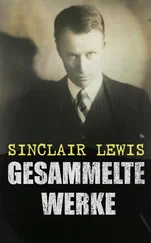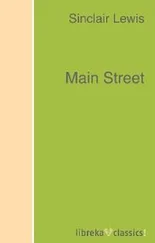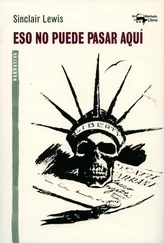He stopped smoking at least once a month. He went through with it like the solid citizen he was: admitted the evils of tobacco, courageously made resolves, laid out plans to check the vice, tapered off his allowance of cigars, and expounded the pleasures of virtuousness to every one he met. He did everything, in fact, except stop smoking.
Two months before, by ruling out a schedule, noting down the hour and minute of each smoke, and ecstatically increasing the intervals between smokes, he had brought himself down to three cigars a day. Then he had lost the schedule.
A week ago he had invented a system of leaving his cigar-case and cigarette-box in an unused drawer at the bottom of the correspondence-file, in the outer office. “I'll just naturally be ashamed to go poking in there all day long, making a fool of myself before my own employees!” he reasoned. By the end of three days he was trained to leave his desk, walk to the file, take out and light a cigar, without knowing that he was doing it.
This morning it was revealed to him that it had been too easy to open the file. Lock it, that was the thing! Inspired, he rushed out and locked up his cigars, his cigarettes, and even his box of safety matches; and the key to the file drawer he hid in his desk. But the crusading passion of it made him so tobacco-hungry that he immediately recovered the key, walked with forbidding dignity to the file, took out a cigar and a match — “but only one match; if ole cigar goes out, it'll by golly have to stay out!” Later, when the cigar did go out, he took one more match from the file, and when a buyer and a seller came in for a conference at eleven-thirty, naturally he had to offer them cigars. His conscience protested, “Why, you're smoking with them!” but he bullied it, “Oh, shut up! I'm busy now. Of course by-and-by — ” There was no by-and-by, yet his belief that he had crushed the unclean habit made him feel noble and very happy. When he called up Paul Riesling he was, in his moral splendor, unusually eager.
He was fonder of Paul Riesling than of any one on earth except himself and his daughter Tinka. They had been classmates, roommates, in the State University, but always he thought of Paul Riesling, with his dark slimness, his precisely parted hair, his nose-glasses, his hesitant speech, his moodiness, his love of music, as a younger brother, to be petted and protected. Paul had gone into his father's business, after graduation; he was now a wholesaler and small manufacturer of prepared-paper roofing. But Babbitt strenuously believed and lengthily announced to the world of Good Fellows that Paul could have been a great violinist or painter or writer. “Why say, the letters that boy sent me on his trip to the Canadian Rockies, they just absolutely make you see the place as if you were standing there. Believe me, he could have given any of these bloomin' authors a whale of a run for their money!”
Yet on the telephone they said only:
“South 343. No, no, no! I said SOUTH — South 343. Say, operator, what the dickens is the trouble? Can't you get me South 343? Why certainly they'll answer. Oh, Hello, 343? Wanta speak Mist' Riesling, Mist' Babbitt talking. . . 'Lo, Paul?”
“Yuh.”
“'S George speaking.”
“Yuh.”
“How's old socks?”
“Fair to middlin'. How 're you?”
“Fine, Paulibus. Well, what do you know?”
“Oh, nothing much.”
“Where you been keepin' yourself?”
“Oh, just stickin' round. What's up, Georgie?”
“How 'bout lil lunch 's noon?”
“Be all right with me, I guess. Club?'
“Yuh. Meet you there twelve-thirty.”
“A' right. Twelve-thirty. S' long, Georgie.”
IV
His morning was not sharply marked into divisions. Interwoven with correspondence and advertisement-writing were a thousand nervous details: calls from clerks who were incessantly and hopefully seeking five furnished rooms and bath at sixty dollars a month; advice to Mat Penniman on getting money out of tenants who had no money.
Babbitt's virtues as a real-estate broker — as the servant of society in the department of finding homes for families and shops for distributors of food — were steadiness and diligence. He was conventionally honest, he kept his records of buyers and sellers complete, he had experience with leases and titles and an excellent memory for prices. His shoulders were broad enough, his voice deep enough, his relish of hearty humor strong enough, to establish him as one of the ruling caste of Good Fellows. Yet his eventual importance to mankind was perhaps lessened by his large and complacent ignorance of all architecture save the types of houses turned out by speculative builders; all landscape gardening save the use of curving roads, grass, and six ordinary shrubs; and all the commonest axioms of economics. He serenely believed that the one purpose of the real-estate business was to make money for George F. Babbitt. True, it was a good advertisement at Boosters' Club lunches, and all the varieties of Annual Banquets to which Good Fellows were invited, to speak sonorously of Unselfish Public Service, the Broker's Obligation to Keep Inviolate the Trust of His Clients, and a thing called Ethics, whose nature was confusing but if you had it you were a High-class Realtor and if you hadn't you were a shyster, a piker, and a fly-by-night. These virtues awakened Confidence, and enabled you to handle Bigger Propositions. But they didn't imply that you were to be impractical and refuse to take twice the value of a house if a buyer was such an idiot that he didn't jew you down on the asking-price.
Babbitt spoke well — and often — at these orgies of commercial righteousness about the “realtor's function as a seer of the future development of the community, and as a prophetic engineer clearing the pathway for inevitable changes” — which meant that a real-estate broker could make money by guessing which way the town would grow. This guessing he called Vision.
In an address at the Boosters' Club he had admitted, “It is at once the duty and the privilege of the realtor to know everything about his own city and its environs. Where a surgeon is a specialist on every vein and mysterious cell of the human body, and the engineer upon electricity in all its phases, or every bolt of some great bridge majestically arching o'er a mighty flood, the realtor must know his city, inch by inch, and all its faults and virtues.”
Though he did know the market-price, inch by inch, of certain districts of Zenith, he did not know whether the police force was too large or too small, or whether it was in alliance with gambling and prostitution. He knew the means of fire-proofing buildings and the relation of insurance-rates to fire-proofing, but he did not know how many firemen there were in the city, how they were trained and paid, or how complete their apparatus. He sang eloquently the advantages of proximity of school-buildings to rentable homes, but he did not know — he did not know that it was worth while to know — whether the city schoolrooms were properly heated, lighted, ventilated, furnished; he did not know how the teachers were chosen; and though he chanted “One of the boasts of Zenith is that we pay our teachers adequately,” that was because he had read the statement in the Advocate-Times. Himself, he could not have given the average salary of teachers in Zenith or anywhere else.
He had heard it said that “conditions” in the County Jail and the Zenith City Prison were not very “scientific;” he had, with indignation at the criticism of Zenith, skimmed through a report in which the notorious pessimist Seneca Doane, the radical lawyer, asserted that to throw boys and young girls into a bull-pen crammed with men suffering from syphilis, delirium tremens, and insanity was not the perfect way of educating them. He had controverted the report by growling, “Folks that think a jail ought to be a bloomin' Hotel Thornleigh make me sick. If people don't like a jail, let 'em behave 'emselves and keep out of it. Besides, these reform cranks always exaggerate.” That was the beginning and quite completely the end of his investigations into Zenith's charities and corrections; and as to the “vice districts” he brightly expressed it, “Those are things that no decent man monkeys with. Besides, smatter fact, I'll tell you confidentially: it's a protection to our daughters and to decent women to have a district where tough nuts can raise cain. Keeps 'em away from our own homes.”
Читать дальше












